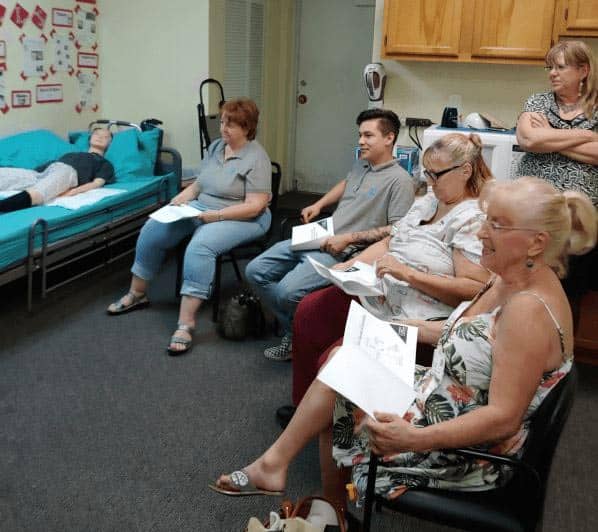Caregiver Dementia Training

Caregiver Dementia Training
Each quarter we provide training for our caregivers to ensure that they are prepared to assist our clients. This quarter our focus is on Dementia. We start with a video called, "Dementia Bookcase Analogy." This video is one of the best and simple ways to explain dementia.
This is followed by our power point presentation:
What is Dementia?
Dementia is an umbrella term that describes a group of symptoms affecting memory, thinking, and social abilities severely enough to interfere with daily functioning. Dementia is not a specific disease. It is a symptom of a disease.
5 Most Common Causes of Dementia
Symptoms of dementia, or cognitive change, can also be the result of other disease or conditions such as stroke, infections, substance abuse, nutritional deficiencies and brain tumors.
Dementia & Cognitive Change
- Of the more than 100 different types or causes of dementia, Alzheimer’s is the most common; 47.5 million people currently live with a form of dementia. This number may double to 95 million people by 2030. It may triple to 145 million people by 2050.
- Alzheimer’s is the 6th leading cause of death in America. •
- Dementia and Aging
- As adults age, they may take more time to process new information or may experience difficulty with memory. However, memory loss alone does not indicate that a person is living with dementia.
According to the Alzheimer’s Association, at least two of the following core mental functions must be significantly impacted to be considered dementia:
- Memory
- Communication and language
- Ability to focus and pay attention
- Reasoning and judgment
- Visual perception
Signs & Symptoms
There is not a definitive test to diagnose dementia. However, Family Physicians that know a person’s medical history can help understand the changes taking place in a person. Family Physicians can complete important lab tests and, because they know the person’s history, can help determine if the signs and symptoms you are seeing are caused by dementia.
This means it is important to report all symptoms to the person’s physician; this will allow for a more accurate diagnosis and, more importantly, a symptom management plan.
The Impact of Dementia
Dementia can change a person’s ability to communicate and interact with their surroundings due to challenges with:
- Communication
- Staying on Topic
- Perception
- Orientation
These changes in ability CANNOT be controlled by the person living with Dementia and may actually make the person feel ashamed, frustrated or angry. This can lead to their own isolation.
Supporting a Person with Dementia
- Focus on abilities - Find ways that will improve their confidence, engagement, emotional well-being and physical well-being.
- Maintain healthy diet - Malnutrition and under nutrition can lead to many health problems. Unlike diabetes or heart disease, people with dementia do not require a special diet. It's important to make sure that they are drinking enough water to help prevent dehydration or urinary tract infections.
- Minimize stress – Coping with emotions is hard and leads to stress, anxiety, anger, and depression. Keep things the same; don’t make a lot of changes. Having a regular "routine" is very helpful. o Prioritize safety - Cognitive change impacts a person’s ability to function in their surroundings. This means that stairs, rugs, clutter, and lighting can cause new challenges for them. o
- Assist with recognition and orientation - Dementia and cognitive change impacts a person’s ability to recognize things in their environment. It can be challenging to make choices from the information around them and they will experience difficulty in recalling things.
- Find new ways to communicate - Often cognitive change causes communication challenges and relationship breakdown. Our identities are tied so closely to our relationships and cognitive change can lead to "loss of themselves". This sense of loss of self can result in isolation, depression, and loneliness.
When our employees are first hired, they all go through a Dementia Live Tour. We want all of our caregivers to experience dementia through the Dementia Live Tour so they can relate better to our dementia population. We strive to make sure our caregivers are well trained and provide them with mandatory quarterly training.
Right at Home also has an Educational Video Series. One of the videos in the series is a Dementia Guide: Supporting Loved Ones with Dementia or Cognitive Change.
Caring for a Loved One with Dementia or Cognitive Change
Dementia is not a specific disease. It's a series of symptoms that can impact a person's ability to think, recall, communicate and complete daily activities. Watch this video series to learn care and communication techniques that can help you address these symptoms when caring for your loved one.
View Dementia Guide Video Series


